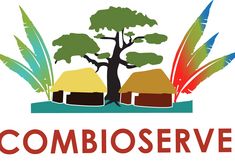The COMBIOSERVE project aims to study and facilitate the effectiveness of community- based management for conserving biocultural diversity in selected regions in Mexico, Brazil and Bolivia. COMBIOSERVE is a three-year project (2012-2015) financed by the European Commission (FP7). Página web en español
NEWS
COMBIOSERVE Conference
-
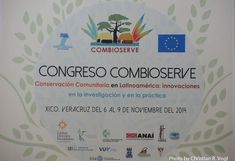 8 Bilder
8 Bilder -
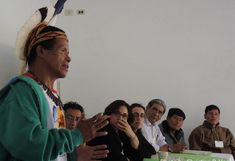 8 Bilder
8 BilderPataxó (Brazil), Tsimane (Bolivia), Chol (Mexico) et al. in an intense science & politics debate (Xalapa, Mexico, 6.11.2014). -
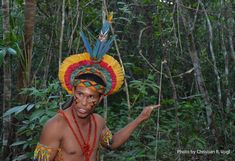 8 Bilder
8 Bilder -
 8 Bilder
8 BilderNot visible enough! Joung filmmakers discuss the usage of participative video in communicating research results (Xalapa, Mexico; 7.11.2014; COMBIOSERVE-Conference) -
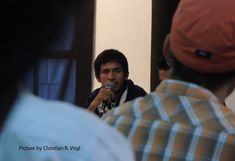 8 Bilder
8 BilderNot visible enough! Joung filmmakers discuss the usage of participative video in communicating research results (Xalapa, Mexico; 7.11.2014; COMBIOSERVE-Conference) -
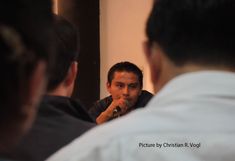 8 Bilder
8 BilderNot visible enough! Joung filmmakers discuss the usage of participative video in communicating research results (Xalapa, Mexico; 7.11.2014; COMBIOSERVE-Conference) -
 8 Bilder
8 BilderNot visible enough! Joung filmmakers discuss the usage of participative video in communicating research results (Xalapa, Mexico; 7.11.2014; COMBIOSERVE-Conference) -
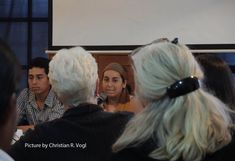 8 Bilder
8 BilderNot visible enough! Joung filmmakers discuss the usage of participative video in communicating research results (Xalapa, Mexico; 7.11.2014; COMBIOSERVE-Conference)
Community-based conservation in Latin America: innovations in research and practice. The international conference organised by COMBIOSERVE took place in Xalapa, Mexico, 6-9 November 2014, and was hosted locally by the Instituto de Ecología (INECOL) and Global Diversity Foundation (GDF). Press release (pdf) For details see: http://combioserve.animalared.org/
COMBIOSERVE at ESP 2014 Conference in Costa Rica
Several COMBIOSERVE partners participated in the 7th Ecosystem Partnerships Conference that took place in Costa Rica from 8th to 12th September 2014. This year there was be a strong focus on community-based conservation. Members of the BOKU team chaired a session on Scaling out and sharing of community-owned strategies on 10th September. This session gathered contributions by five FP7 projects on the theme of community-based conservation in Latin America. Read the press releases here: International / Local / National
International Innovation on COMBIOSERVE
The issue of the magazine “International Innovation” (Research Media) published a report on COMBIOSERVE in September 2014. The article features an interview with Gary Martin (GDF), Christian R. Vogl and Christoph Schunko (both BOKU) where they discuss the importance of local participation, and the difficulties of integrating different forms of expertise. Read the article here.
Focus & Method
The COMBIOSERVE consortium has been analyzing the historical development and present status of the community conserved areas. Furthermore potential future scenarios and the ability of the conserved areas to adapt (resilience) to the constantly changing natural and socio-cultural environment are being explored. For its research activities the consortium is applying a co-enquiry approach (collaborative research between indigenous communities, community researchers and scientists of the consortium). During the research this method is being further developed and refined and how-to co-enquiry protocols are developed. The indigenous communities and locally active civil society organizations that are part of the COMBIOSERVE project have already been working together for many years. During the co-enquiry process the indigenous communities suggest urging research topics, which will be then analyzed by the community researchers. The scientists in the project support these local research processes. One of the project aims is to build an innate research capacity of the indigenous communities in order to be able to carry out, assign and assess research, respectively its results.
Results
The project results include scientific papers, as well as policy briefs, participatory videos documenting the experiences of indigenous communities with community management of natural resources, and methods manuals. The manuals concentrate on those methods which support collaborative research between local communities and scientists (co-enquiry). Examples for our way of working include comprehensive information about the project for indigenous communities and written agreement before starting the collaboration, joint analysis of research results between indigenous communities and scientists, as well as making the raw data and results available for the collaborating communities. Project website // COMBIOSERVE YouTube Channel // Poster (EN)
Project team
The consortium consists of universities from Europe and Latin America, civil society organizations active in the relevant research areas as well as representatives of indigenous communities. BOKU is the project coordinator of COMBIOSERVE. The BOKU-team (Working Group Knowledge Systems and Innovation, Institute for Organic Farming, Department for Sustainable Agricultural Systems): Christian Reinhard Vogl (coordinator) Christoph Schunko (project manager) Maja Tumpej (project support) For more information see the BOKU research database (FIS).
References
Berkes, F. (2009): Community conserved areas: policy issues in historic and contemporary context. In: Conservation Letters 2 (2009) 19-24 Bottazzi, P. and Dao, H. (2013): On the road through the Bolivian Amazon: A multi-level land governance analysis of deforestation. In: Land Use Policy 30 (2013) 137– 146 Kothari, A. with Corrigan, C., Jonas, H., Neumann, A., and Shrumm, H. (eds). (2012): Recognising and Supporting Territories and Areas Conserved By Indigenous Peoples And Local Communities: Global Overview and National Case Studies. Secretariat of the Convention on Biological Diversity, ICCA Consortium, Kalpavriksh, and Natural Justice, Montreal, Canada. Technical Series no. 64, 81-86. Kothari, A. with Corrigan, C., Jonas, H., Neumann, A., and Shrumm, H. (eds). (2012): Recognising and Supporting Territories and Areas Conserved By Indigenous Peoples And Local Communities: Global Overview and National Case Studies. Secretariat of the Convention on Biological Diversity, ICCA Consortium, Kalpavriksh, and Natural Justice, Montreal, Canada. Technical Series no. 64, 30. Sobrevila, C. (2008): The Role of Indigenous Peoples in Biodiversity Conservation. The Natural but Often Forgotten Partners. The International Bank for Reconstruction and Development, Washington, xii Nepstad, D., Schwartzman, S., Bamberger, B., Santilli, M., Ray, D., Schlesinger, P., Lefebvre, P., Alencar, A., Prinz, E., Fiske, G., Rolla, A (2006): Inhibition of Amazon Deforestation and Fire by Parks and Indigenous Lands. In: Conservation Biology Volume 20, No. 1, 65–73

